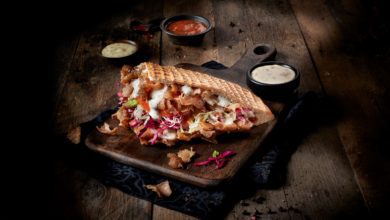How international students are influencing the UK’s food scene
As international students and diaspora communities shape Britain’s dining habits, delivery platforms and street food brands alike are adapting to meet a new definition of ‘local.’

Register to get 1 free article
Reveal the article below by registering for our email newsletter.
Want unlimited access? View Plans
Already have an account? Sign in
International students and diaspora communities are increasingly influencing the UK’s hospitality sector. Their appetite for genuine flavours and cultural familiarity is creating new opportunities for businesses willing to embrace global cuisines, ultimately shaping menus, delivery app offerings, and high street food trends nationwide. From bubble tea and hotpot to Korean street food, the tastes of these communities are reshaping the way operators think about the “local” dining experience.
According to the Higher Education Statistics Agency (HESA), the UK hosted over 732,000 international students in the 2023/24 academic year, accounting for roughly a quarter of the higher education population. Many come from Asia, including a substantial number from China, where food plays a central role in cultural identity and community. At the same time, more than 5.5 million people in England and Wales – nearly 10% of the population – identify as Asian or Asian British, representing a vibrant diaspora community with deep culinary traditions. For operators, this demographic presents a powerful combination of purchasing power, adventurous tastes, and a strong attachment to food culture.
The influence of these communities is reflected in everything from menu development to delivery platform strategies. Companies like HungryPanda, a specialist Asian food delivery service, and Korean fast-food chain Bunsik are each capitalising on these trends from different angles. HungryPanda acts as a gateway for Chinese F&B brands seeking to enter the UK market, while Bunsik designs street food concepts to resonate with both international students and curious local diners. Together, they illustrate the wider trend of Britain’s dining habits becoming increasingly globalised.
HungryPanda, founded by students at the University of Nottingham, has expanded from a student-focused delivery service into a platform operating in ten countries. Its core mission remains serving overseas Chinese and Asian communities in the UK. “The international student and diaspora communities are at the very heart of HungryPanda’s UK business – and, in fact, at the very heart of our story,” says Kitty Lu, director of public affairs at HungryPanda. “Our original mission was simple: to serve these communities by giving them access to authentic tastes of home. That remains the foundation of everything we do, even as the company has grown globally.”
The company provides a comprehensive support network for Chinese brands entering the UK market. “Challenges often start with the basics, like translating the brand for local consumers, sourcing specific ingredients, and navigating food regulations,” Lu explains. Through PandaFresh, HungryPanda offers access to ingredients that new restaurants might struggle to source independently, from specific teas to regional meat cuts. The platform also advises on menu design, packaging, and delivery logistics to ensure consistent quality and reliable service.
Marketing guidance is another area where HungryPanda adds value. “We have rich data on local demographics and eating habits,” Lu says. “We can guide brands on location choice, pricing, and promotional strategies. Essentially, we help operators build loyal customer bases and lay the foundation for long-term growth.”
Cha Halo (茶话弄) is a recent example of HungryPanda’s role in facilitating successful UK market entry. The brand launched its first London store in mid-2025, facing challenges around supply chain and understanding overseas consumer preferences. “We helped them resolve early logistical hurdles through our UK supplier networks,” Lu says. “We also designed a pre-launch campaign combining online pre-sales with offline promotion. This helped build strong initial awareness and ensured a smooth soft opening.”
According to Lu, international students often act as cultural ambassadors, introducing peers to new flavours. “What starts as a comfort food for them – whether it’s bubble tea, hotpot, or regional Chinese cuisines – often becomes a discovery for their local friends. In the UK, student-driven demand has helped bubble tea evolve from a niche treat into a mainstream beverage available across high streets.”
HungryPanda’s work highlights broader opportunities for UK caterers and hospitality operators. By engaging with international students and diaspora communities, operators can innovate menus with authentic flavours, introduce seasonal offerings tied to cultural festivals, and tap into digital platforms with strong engagement. “These communities are not only willing to spend, but eager to explore and share authentic dining experiences,” Lu notes. “Operators that serve these groups well participate in shaping the UK’s food culture while unlocking new growth opportunities beyond niche markets.”
The student-driven trend extends beyond delivery platforms into physical restaurants, particularly in university towns. Bunsik, a Korean street food chain, recently opened its first South West site in Bristol, marking the brand’s eighth UK outlet and first franchise. Founded in 2021 by restaurateur Jae Cho, Bunsik is credited with popularising the Korean corn dog – a viral social media sensation often filled with mozzarella or chicken – and introducing casual Korean dining to UK high streets.
Franchisee Will Bray says Bristol was a natural fit. “The city has an adventurous food culture and a diverse population, with a large student and Asian community. That made it an excellent fit for Bunsik.” Early response has exceeded expectations. “Customers are coming from all over Bristol, and some even travel two hours to visit. The international student presence definitely influenced the decision,” he says.
Bunsik’s appeal combines visual and experiential elements. “Students love the social media-friendly ‘cheese pull,’ while local diners favour fried chicken with Korean seasoning,” Bray explains. “It’s a diverse crowd. People film the food and the vibe; they really engage with the experience.” The restaurant’s bright and playful interior, along with interactive elements such as a wall ruler for measuring the cheese pull, adds to its Instagram-ready charm.
Supply logistics posed initial challenges outside London. “It was trickier to source authentically Korean ingredients, but we’ve built strong relationships with local suppliers,” Bray says. Staffing, meanwhile, has exceeded expectations. “Bristol has a vibrant hospitality workforce. The universities are excellent sources for flexible, culturally engaged staff.”
Maintaining authenticity while appealing broadly is central to Bunsik’s expansion strategy. “The food stays true to Korean street food traditions – sauces, textures, spices – but with playful twists,” Bray says. “Authenticity and accessibility don’t have to clash. Students also help introduce the brand to wider audiences.”
Bunsik plans further expansion into student-heavy cities such as Cardiff, Southampton, Reading, and Brighton. “Anywhere with a strong student base and openness to new food experiences is a potential site,” Bray confirms.
For UK operators, the key takeaway is clear. Platforms like HungryPanda and franchise concepts like Bunsik show that engaging with international student and diaspora communities is not just a niche opportunity but a pathway to mainstream demand. “There is huge potential for UK caterers and hospitality operators to connect with these groups,” Lu emphasises. “They are diverse, engaged with food culture, and eager to explore new experiences.”
From bubble tea to Korean corn dogs, the foods once enjoyed primarily by overseas students are now shaping menus, delivery offerings, and high street margins across Britain. For caterers, restaurants, and franchise owners alike, responding to this shift is less about novelty and more about business sense. Those that embrace the trend early are positioned to capture cultural relevance and commercial growth simultaneously.







